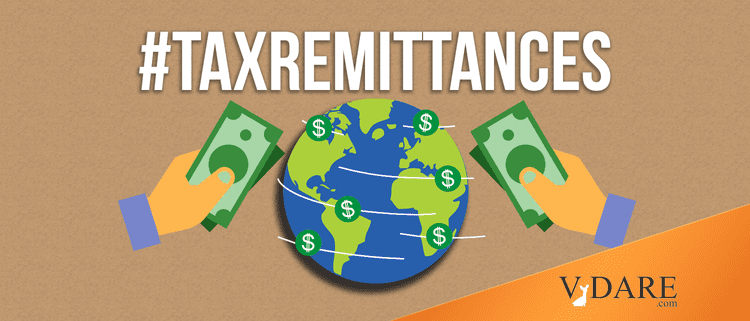


01/06/2020
Oklahoma continues to do what @realDonaldTrump promised he would do 3 yrs ago: tax remittances. Last year, OK collected $13 million fees on such money transfers. FYI: In 2018, nationwide remittances from illegal & legal alien workers in the US to Mexico totaled $34 billion. https://t.co/JFDHaGAj5l
— Michelle Malkin (@michellemalkin) January 6, 2020
By far the most infuriating shortcoming of the Trump Administration has been its baffling and inexplicable refusal to tax remittances. Regardless of which Democrat wins the nomination, he or she will obviously score points in the debates by hitting President Trump’s vow that there would be a "powerful" border wall that wouldn’t cost Americans anything, because "Mexico is going to pay for it." A remittance tax would be an easy way to accomplish this. It would also force Democrats to defend foreigners sending money out of the country in a process that fuels dependence and continued legal and illegal immigration.
This is already government policy in Oklahoma, so we shouldn’t hear any excuses about how this is impossible.
Oklahoma sets a modest (too modest, really) fee of 1 percent on all outgoing wire transfers. The fee is a withholding against the state income tax; to the extent that those remitting money pay their state income taxes the fee is not a tax. But since most of the transfers are outside the state tax system, it works as a de facto tax on untaxed income.
Now, there are comparatively few illegal aliens in Oklahoma, and were such a fee established nationally at, say, 2 percent, it would bring in more than $3 billion a year to the federal government. The Pew Research Center estimated that in 2017 remittances from the United States were more than $148 billion.
Sadly, neither the Obama nor the Trump administrations has moved in this direction.
The most recent report of the Oklahoma State Tax Commission, for the year 2018-2019, shows wire transfer fee receipts of $13,147,000, an increase from the total of $12,874,000 two years earlier. (See p. 11 of the 2018-2019 report.)
[Oklahoma Still Shows the Way on Collecting Taxes from Illegal Aliens, by David North, Center for Immigration Studies, January 4, 2020]
Of course, besides foreigners, some people are benefiting from remittances. Financial companies are already competing for the lucrative market. Among them is PayPal, which won’t let us use their services (we're suing and you can help us) but is more than happy to facilitate American money being sent abroad.
Ripple & XRP researcher, Crypto Eri, recently uploaded a video regarding PayPal’s new commercial agreement with “one of the largest online commerce and payments ecosystems in Latin America” and the eighth largest marketplace in the world, MercadoLibre. In March 2019, PayPal had made a $750 million investment into MercadoLibre as part of a $1.85 billion equity stake in the Argentinian e-commerce giant. This investment was supposed to support its goal of becoming the primary online retailer in Latin America.
Soon after, in May, we learned that Ripple had signed a partnership with Ria, a financial services firm which has the second-largest money transfer network in the world, to enable instant payments worldwide. Later in October, Ripple and Coinbase provided capital to cryptocurrency exchange, Bitso, to help expand their operations into Argentina and Brazil.
Earlier in the year, Ripple had launched its On-Demand Liquidity (ODL) product for Mexican users with MoneyGram, and Bitso’s function as a liquidity provider had been crucial for the U.S-Mexico corridor.
In November, just a month later, PayPal partnered with Ria to help boost the adoption of its payments app, Xoom, which has been positioned as a market competitor to Ripple. On 30 December, PayPal announced that it had signed a commercial agreement with MercadoLibre to “offer innovative financial solutions to help people who are underserved by the traditional financial system.” This development contributed to PayPal’s stock value rising by over 2.5% in just one day.
Further, as part of the agreement, PayPal announced that it will be made available as a payment option on the Mercado Pago online checkout page for people in Brazil and Mexico. This would expose PayPal’s 300 million users to hundreds of thousands of new merchants, but more importantly, expedite the adoption of Xoom in Latin America.
[Ripple, PayPal will compete for Latin America’s remittance market, by Manu Naik, AMBCrypto, January 6, 2020]
Unfortunately, this may just be another example of the Trump Administration rewarding Woke Capital at the expense of the nationalist supporters the president will need if he wants another term. At the very least, he’s enabling an easy Democrat line of attack that anyone from Bernie Sanders to Michael Bloomberg would be crazy to ignore.